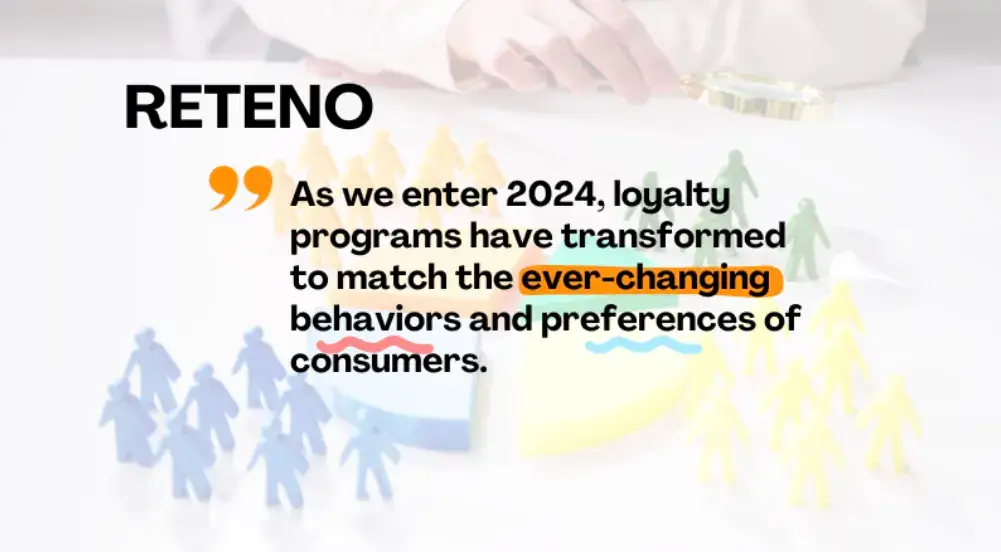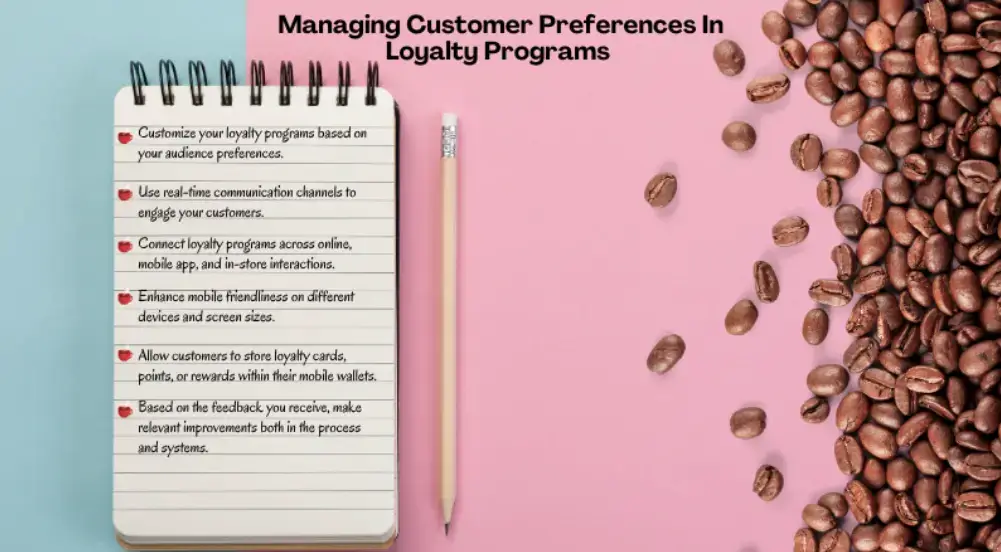Loyalty programs have been essential to businesses' strategies to keep customers returning for years, changing from basic punch cards to more advanced, data-driven initiatives. What key factors should you consider while planning new rewards for your customers? How can business owners manage clients’ options and increase sales effectively?
Today, over 90% of companies have some kind of loyalty program. Further, more than 83% of consumers say loyalty programs influence them to buy from a brand again when they belong to its loyalty program.
Shortcuts:
- Understanding the Shift in Customer Preferences
- 6 Tips for Managing Customer Preferences in Your Loyalty Program
As we enter 2024, loyalty programs have transformed to match consumers' ever-changing behaviors and preferences.
In the past, loyalty programs mainly revolved around rewarding customers based on how often they made purchases or the amount they spent.
However, this has changed significantly. Today, there is a new challenge to face - a consumer base that seeks personalized experiences and values ethical engagement.
Understanding The Shift In Customer Preferences
In 2024, the key focus of loyalty programs will be taking personalization to new levels.
-
It's The Age Of Personalization
It's not just about customized rewards anymore - customers want a stronger emotional connection with your business and you as a person.
It means you must understand customers' lifestyles, values, and ethics.
The key focus of loyalty programs will be taking personalization to new levels.
Customers want more than just their product preferences met - they want brands that align with their beliefs and values.
Loyalty programs should go beyond transactional benefits and strive to create an emotional bond by resonating with customers' principles.
For example, if you support an environmental cause, you could provide eco-friendly rewards, appealing to environmentally conscious customers.
-
Inclusivity And Diversity
Modern-day customers are placing increasing importance on inclusivity and diversity in loyalty programs.
Brands that embrace and champion inclusivity are more appealing to customers.
It can be demonstrated by catering to diverse customer segments, considering various cultural backgrounds, preferences, and needs.
Inclusivity can be showcased through diverse product ranges, accommodating language preferences, and providing culturally relevant experiences that honor and celebrate the diversity of their customer base.
-
Experience Economy Evolution
The reign of the experience economy is causing a significant shift in how loyalty programs operate.
Customers no longer just want to collect points or get discounts; they crave unforgettable and engaging experiences.
You need to think outside the box regarding loyalty programs. Instead of the usual rewards, aim to offer experiences that go beyond expectations.
It could mean giving customers unique access to behind-the-scenes events, providing personalized consultations, or hosting interactive workshops that add value to their lives beyond the usual buying and selling.
-
Mobile Loyalty Program Revolution
Mobile loyalty programs are grabbing all the attention these days, fitting right into the busy digital lives of customers.
In this age of constant connectivity, customers aren't just looking for rewards; they want experiences customized to their unique preferences.
That's where a mobile loyalty program comes in! It gives customers personalized experiences they can enjoy whenever and wherever they want.
-
Interactive Engagement
Gamification elements and interactive engagement are becoming increasingly popular in loyalty programs.
Customers are attracted to interactive experiences that bring fun and excitement. This is especially true for a mobile loyalty program.
Add quizzes, challenges, or interactive contests to incorporate gamification in a mobile loyalty program.
These elements make the experience enjoyable and motivate customers to participate actively, resulting in more robust engagement and loyalty.
6 Tips For Managing Customer Preferences In Your Loyalty Programs
- Segmentation for Personalization
- Real-Time Engagement and Communication
- Omnichannel Integrations
- Optimized Mobile Experience
- Mobile Wallet Integration
- Feedback Mechanisms
Businesses need to pay special attention to managing customer preferences in loyalty programs.
It will help them create strong, long-lasting customer relationships while boosting customer retention.
It's essential to have a strategic approach that focuses on personalization, convenience, and providing value.
Here are some helpful tips on how to effectively manage customer preferences:
1. Segmentation for Personalization
You must segment customers based on their preferences, behaviors, and demographics.
By understanding different customer segments, companies can customize loyalty program offers and rewards to make them more relevant and impactful.
- Divide customers into segments based on preferences, behaviors, and demographics.
- Customize loyalty program offerings for each segment.
- Use personalized marketing strategies for effective engagement.
2. Real-Time Engagement And Communication
Today, customers prefer prompt communication and swift replies to their queries. Keeping customers interested in your loyalty program requires timely engagement.
You can instantly connect with customers and provide personalized experiences through real-time communication channels.
- Consider incorporating real-time communication channels like chatbots or push notifications to enhance user experience.
- Send customized offers and real-time updates tailored to each customer's behavior.
- Encourage immediate engagement by making time-sensitive offers.
3. Omnichannel Integrations
In today's world, customers engage with brands through multiple channels.
To provide a consistent and enjoyable customer experience, it's important to seamlessly connect loyalty programs across online, mobile app, and in-store interactions.
This way, you can create a cohesive and satisfying journey for our valued customers.
As keeping track of multiple channels and responding to customers instantly may be challenging, many companies consider delegating it to a third party.
Solutions like ecommerce customer service outsourcing are highly effective for dynamic businesses with an extensive customer flow, e.g., online stores or marketplaces.
- Make sure to integrate loyalty programs across all customer touchpoints.
- It's essential to collect data from various channels to get a complete understanding of customer interactions.
- Gathering information from multiple sources gives you a comprehensive view of how customers engage with your business.
- Ensure consistency in rewards and experiences across all channels.
4. Optimized Mobile Experience
The mobile experience is crucial to the success of a mobile loyalty program.
Ensure the program's interface is easy to use, intuitive, and designed to work well on different devices and screen sizes.
- Consider creating a specialized mobile app or enhancing your mobile website to serve your loyal customers better.
- Prioritize easy navigation and quick access to loyalty features within the app or mobile site.
- Make sure to use mobile-responsive design so that your website looks great and functions smoothly on any device.
5. Mobile Wallet Integration
Integrating the loyalty program with mobile wallets enhances convenience for users by allowing them to access and redeem rewards directly from their mobile devices' wallets.
- Enable integration with popular mobile wallet apps (such as Apple Wallet or Google Pay).
- Customers can store loyalty cards, points, or rewards in their mobile wallets.
- Simplify the redemption process by enabling one-tap access to rewards through the mobile wallet.
6. Feedback Mechanisms
Customer feedback is precious when it comes to improving loyalty programs.
By putting in place effective ways for customers to provide their opinions, you can create an environment where their voices are heard and their satisfaction is enhanced.
- Make it easy for customers to share their feedback on the loyalty program by creating a simple feedback customer survey.
- Act on the feedback received to make relevant improvements.
- Acknowledge and reward customers for their input and suggestions.
Wrapping Up
As we begin 2024, brands must take a comprehensive approach to understanding what customers want from loyalty programs.
It means putting personalization at the top of the list, meeting the demands of the experience economy, embracing inclusivity and diversity, focusing on creating mobile loyalty programs, and encouraging interactive engagement.
By embracing these ever-changing preferences, businesses can build stronger customer relationships, foster genuine customer loyalty, and create loyalty programs beyond just transactional perks.
In doing so, these programs will have a profound and lasting impact on today's diverse and ever-changing customer base.






